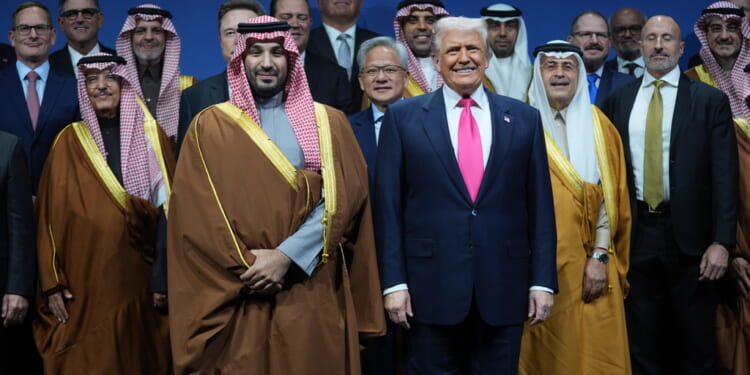President Donald Trump announced that he would work to end the Sudanese civil war shortly after Saudi Crown Prince Mohammed bin Salman advocated as much.
The Sudanese civil war has escalated into the greatest humanitarian crisis in the world since armed conflict broke out between the Sudanese Armed Forces and paramilitary Rapid Support Forces. Though largely overshadowed in the news by wars in the Levant and Ukraine, Sudan once again made headlines late last month when videos and evidence surfaced of a major massacre by RSF troops in the city of El Fasher. During his personal meeting with Trump on Tuesday, Salman urged Trump to use his peacemaking efforts to end the war, an appeal that paid off on Wednesday.
RSF AGREES TO US HUMANITARIAN CEASEFIRE PROPOSAL AS GOVERNMENT DRAGS FEET
“Tremendous atrocities are taking place in Sudan,” Trump wrote in a post on Truth Social. “It has become the most violent place on Earth and, likewise, the single biggest Humanitarian Crisis. Food, doctors, and everything else are desperately needed. Arab Leaders from all over the World, in particular the highly respected Crown Prince of Saudi Arabia, who has just left the United States, have asked me to use the power and influence of the Presidency to bring an immediate halt to what is taking place in Sudan.”
“It is considered a Great Civilization and Culture, unfortunately gone bad, but one that can be fixed with the cooperation and coordination of Countries, including those in the Region of tremendous Wealth, who want this to happen. We will work with Saudi Arabia, United Arab Emirates, Egypt, and other Middle Eastern partners to get these atrocities to end, while at the same time stabilizing Sudan,” he added, concluding with “GOD BLESS THE WORLD!”
Earlier on Wednesday, Trump said it “wasn’t on my charts to be involved” in efforts to end the conflict, but credited Salman’s appeal with changing his mind.
“We’re going to start working on Sudan,” he declared.
The United States has been working to resolve the conflict for months, forming a group with the United Arab Emirates, Saudi Arabia, and Egypt called the “Quad.” Although the group has made several peacemaking attempts, its efforts so far haven’t borne fruit.
The Quad’s work has been particularly complicated due to the deep involvement of Egypt, Saudi Arabia, and the UAE in the war, with the former two supporting the SAF and the latter supporting the RSF. The UAE, in particular, has faced widespread criticism for its alleged heavy support for the paramilitary group. Its support has been so extensive that Abu Dhabi has been credited with almost single-handedly reviving the RSF and turning the tide with an influx of weapons and cash after its defeat at Khartoum earlier this year.
Salman’s appeal to Trump could also reflect a fear of further losses by its ally, the SAF. The loss of El Fasher marked a massive blow for the group, stripping it of its last bastion in Darfur and cutting it off from the western half of the country. The emboldened RSF has continued its advance eastward after the victory, with the SAF struggling to contain the advance.
Experts largely believe that the war will settle into a stalemate, as neither side possesses the logistics to maintain an advance deep into the other’s heartland.
While the UAE has faced blistering criticism over its support for the RSF despite its litany of atrocities, Washington has refrained from pointing fingers. Secretary of State Marco Rubio voiced his frustration with the Quad when asked about the UAE’s role in the war last week, but didn’t name the country directly.
“This needs to stop. … We’re not going to let the Quad process that we’ve set up be a shield that people hide behind and say, ‘Well, we’re involved with the Quad. We’re trying to solve it.’ We need actionable results, and they need to happen very quickly,” he said.
Although Saudi Arabia is widely regarded as an ally of the SAF, its support is more limited compared to that of Egypt, Iran, Russia, and Turkey’s support of the government. It has leveraged this restraint in acting as a mediating figure, a role taken to its logical conclusion with Salman’s appeal to Trump.
The RSF has shown a willingness to engage in the peace process after its public relations debacle at El Fasher, agreeing to a Quad-proposed humanitarian ceasefire on Nov. 6. The SAF declined, holding to its position that it would only accept a ceasefire that involved a full RSF withdrawal from all of its held cities.
Massad Boulos, U.S. senior adviser for Arab and African affairs, voiced optimism that a ceasefire would be reached on Nov. 3. He said the two sides “agreed in principle” to a truce.
UN ADOPTS MEASURE TO SEND WAR CRIMES INVESTIGATORS TO EL FASHER MASSACRE SITE IN SUDAN
“We have not recorded any initial objection from either side. We are now focusing on the fine details,” he said in a statement carried by the Sudan Tribune.
While Boulos’s statement seemed far-fetched at the time, Trump’s throwing his weight behind the peace process could force the sides into mediation. However, he still faces significant obstacles. Though the civil war is unique in being largely nonideological, the SAF and RSF are widely believed to be irreconcilable, with the massacre at El Fasher only making things worse. It would take considerable international pressure to force both sides to back down from their maximalist aims and achieve peace.
















